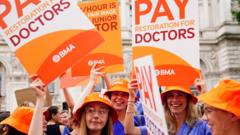Summary
Doctors in England are considering going on strike because they were offered a 4% pay increase, which the British Medical Association (BMA) says is not enough to make up for past pay freezes. The Department of Health announced that resident doctors would receive an extra payment to bring their average pay rise to 5.4%. Meanwhile, other NHS staff like nurses received a smaller 3.6% pay rise, leading to dissatisfaction among different health unions.
Key Facts
- Doctors in England received a 4% pay rise, which they find insufficient.
- The British Medical Association (BMA) says doctors' pay is about 25% lower than 16 years ago when adjusted for inflation.
- Resident doctors participated in 11 strikes over the past two years, seeking a 35% pay increase.
- The Department of Health offered resident doctors a £750 top-up, raising their average pay rise to 5.4%.
- Nurses and other NHS staff received a pay increase of 3.6%, triggering discontent from health unions.
- In Scotland, NHS staff accepted a 4.25% pay increase for 2025-26.
- Education unions plan to dispute if the government does not fully fund a similar 4% pay rise for teachers.
- The UK government faces criticism for not reversing years of prior pay neglect despite attempting pay increases.
